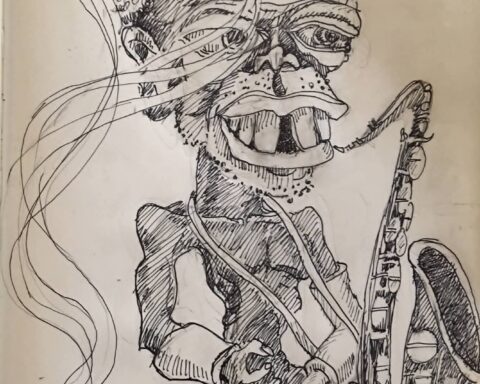By Dr. Charles Obiajulu Ugwu
The Bridge Is Everywhere Now
They say you get used to anything if you see it often enough. That the mind eventually dulls the sharpness of pain, even the kind that isn’t your own. But what does it mean when the sight of half-naked children curled under bridges no longer startles us? When a mother clutches her infants under pouring rain and it doesn’t disrupt traffic or conscience? When babies sleep to the lullaby of exhaust fumes and market noise, and we drive past without turning down the music?

I stood under one of those bridges at Ojuelegba in Lagos recently. One of many across African cities that have become home to the forgotten. Five children, all under ten, were huddled together with their mother in a damp, crumbling corner, trying to keep warm against the cold. Usman, the eldest, was maybe nine. His eyes weren’t begging for food. They were scanning and measuring risk. Watching his mother guard the day’s takings from the street as a few rough boys loitered too close. The rain dripped mercilessly. There was no umbrella. No wall. Just concrete, fatigue, and fear.
It was the absence of a father that struck me most. And not just for Usman. It was a pattern. Group after group: mothers and children. No men. No fathers. These children didn’t drop from the sky. Someone fathered them. Yet these same men now live detached from consequence, free of shame. The bridge was full of children. But empty of accountability.
Beneath the Surface of a Silent Crisis
This is not just a social problem. It is an indictment of modern African statecraft. Our cities have grown into disjointed mosaics of gleaming towers rising beside makeshift shelters, luxury cars brushing past barefoot toddlers. In Lagos, Nairobi, Kinshasa, and Johannesburg, the opulence of a few coexists with the destitution of many.
We speak fluently about GDP growth and foreign direct investment, but cannot account for the lives lived under our bridges. Why? Because the language of economics has no regular terminology for abandoned children. Because government agencies are quick to demolish shanties, yet slow to build family support systems. And because the urban poor, especially destitute mothers, live in liminal spaces that we encounter everywhere yet politically invisible.
The familiar sight of street families especially female-headed ones, raises uncomfortable questions about the structure of our societies. What has happened to our kinship systems? Where are the fathers, the extended families, the communities that once absorbed such shocks? And more provocatively: how have we, as a people, normalized such radical abandonment?
Who Is Responsible? And Who Gets to Walk Away?
In a lion pride, roles are clear. The cubs are not left to fend for themselves. Even in nature, protection is embedded in survival. But in too many human societies today, especially across parts of urban Africa, fatherhood has become optional. Disposable. Selective.
Patriarchy once came with responsibilities—flawed though it was. Now, what remains is entitlement without duty. Rights without roles. The African man, traditionally the provider and protector, has in many places become a shadow figure economically squeezed, emotionally distant, or culturally indulged into absence.
Of course, this is not universal. There are still countless fathers who sacrifice daily for their families, often invisibly. But we must speak about the epidemic of abandonment. Not just physical absence, but moral and structural abandonment: men fathering children they will never nurture, systems offering no tracking or enforcement of responsibility, and a society that excuses this with the phrase: “that’s how things are.”
Yet, the cost is staggering.
Children raised in such instability are more likely to drop out of school, engage in child labor, fall prey to trafficking, or become perpetrators and victims of urban violence. This isn’t just a humanitarian crisis. It’s a time bomb.
The Casualization of Parenthood: The Baby Mama Economy
One of the most disheartening cultural shifts in recent times is the normalization of fragmented, unaccountable parenthood romanticized through the popularization of the “baby mama” and “baby daddy” phenomenon. What was once an unfortunate byproduct of personal or societal failure is now stylized, joked about, and even glorified in music, film, and social media.
This isn’t about moral policing. It’s about structural consequences. When people produce children in loose, undocumented relationships devoid of shared accountability, the result is predictable: emotional neglect, financial instability, and social detachment. Children grow up in households with unclear roles, absent supervision, and often, conflicting parental signals if any.
And while some may argue that such models reflect a modern redefinition of family, the African context still reeling from fragile state systems, poverty, and cultural erosion cannot afford this luxury. The state has no safety net wide enough to catch these children when informal love arrangements go sour. The “baby mama” economy, in our context, is a pipeline into generational dysfunction.
Churches and Charity: The Rhetoric of Righteousness
Equally disturbing is the role of religious institutions and NGOs in maintaining the illusion of care. Many churches, mosques, and registered charities make the plight of the vulnerable central to their public messaging. Yet, scratch beneath the surface and you find systems more interested in optics than outcomes.
Churches organize “outreach Sundays” with photo-ready handouts of rice and oil but fail to challenge the very cultural and policy conditions that create abandonment in the first place. Sermons exhort members to ‘give to the poor,’ yet few demand that men remain fathers to their children or that congregations support long-term family reintegration programs.
Charity, for many organizations, has become performance good for branding, donor appeals, and social media. It is development theatre, not transformation. These organizations tick boxes. They issue press releases. But rarely do they follow up, build systems, or shift root causes.
It is not uncommon finding in the church calendar and activities of their associations and agencies, bold agenda items of prison visitations. Here, times, efforts and resources are devoted to making photoshoots of gifts to these children who have found themselves in a new form of abandonment this time behind bars because the world didn’t care. In a memorable chat with one of the inmates who identified himself as being on awaiting-trial for over four years, he lamented the hypocrisy in the church visitation when they could have prevented his getting into trouble for going home late after a church program from where he was picked by the police for wandering.
The State’s Quiet Abdication
Where is the state in all of this? The African state already overburdened, under-resourced, and often captured by elite interests has largely failed to develop coherent frameworks for family protection and social safety nets.
Social welfare programs, where they exist, are poorly funded and inconsistently implemented. Orphanages and child shelters are overcrowded or underregulated. Family courts are slow and expensive. Paternity enforcement is rare. Women are left alone to shoulder the burden of care with no legal backup, no housing assistance, no income guarantees.
Governments may point to development plans and poverty alleviation programs. But without intentional policies targeting abandoned families especially those living in informal spaces, these efforts ring hollow.
Society’s Complicity in the Normalization of Misery
What does it say about us that we now accept the presence of child beggars at traffic lights like we accept potholes or hawkers? That we no longer pause when a toddler taps our window asking for change, barefoot and filthy?
We have ritualized pity. A few naira here. A little food there. Just enough to quiet the conscience. Not enough to change anything. We post Instagram stories of our charity drives, but ignore the systems that create the need for charity in the first place.
Worse, we have moralized poverty. We say “God will help them” or “at least they’re surviving” as if fate not structural dysfunctions produced their reality.
Even NGOs and religious bodies, often well-meaning, have become caught in the loop of relief over reform. Handouts over empowerment. Sympathy over justice.
The Gendered Face of Urban Despair
The overwhelming presence of women in these street scenarios isn’t incidental. Women are more likely to be abandoned, underpaid, and overburdened. The feminization of poverty is real and nowhere is it more stark than under the bridge.
Yet, these mothers are not just victims. They are also heroes. They feed children with nothing. They protect with no weapons. They endure with no rest. Some even organize small support groups, share leftovers, teach one another street safety. Their resilience is stunning but it should never be romanticized. Resilience is not a substitute for justice.
What Must Be Done And Who Must Do It
This cannot remain a spectator sport. We must disrupt the comfort of indifference. Beyond conventional fixes, we need bold, culturally rooted interventions:
Reinforce Paternity Responsibility: Governments must enforce child support laws. Men must be held legally and financially accountable for the children they father. This includes national paternity databases and family support enforcement systems.
Urban Family Support Centers: Cities must invest in shelters, trauma counseling, and day-care centers for street families. These centers should be safe spaces—not just for temporary relief, but for long-term rehabilitation.
The Ubuntu Accountability Network (UAN): A novel, homegrown model where local communities appoint respected elders, youth leaders, and trained volunteers to follow up on child welfare cases. This system should work beyond legal enforcement—by leveraging moral authority, public shame, and communal mediation. Volunteers should be individuals deeply respected for their integrity and empathy. Incentives shouldn’t be cash-based alone but tied to community honors, storytelling traditions, and intergenerational pride. The idea is to re-center responsibility in culturally meaningful ways, making neglect not just illegal—but un-African.
National Parenting Campaigns: Let’s de-stigmatize fatherhood support and revalorize male responsibility. Schools, faith institutions, and media have roles to play in reshaping norms.
Public Policy Realignment: Welfare, housing, and urban planning must center vulnerable families. No development policy should be considered complete if it does not include a framework for child and family protection.
Citizen Engagement: We, the people, must speak out. Advocate. Volunteer. Fund. Demand. Change begins when enough people decide that silence is no longer an option.
The True Cost of Neglect: A Time Bomb We’re All Sitting On
Beyond the humanitarian anguish lies a more pragmatic truth: the social cost of abandoned, vulnerable children is immeasurable and we are already paying it.
In Nigeria today, the sharp uptick in kidnapping, armed robbery, banditry, and cybercrime (like Yahoo Yahoo) is no accident. A generation raised in streets and shelters, denied guidance and dignity, becomes fertile ground for criminal recruitment. The talent market for crime is fed daily by children raised in despair.
Economically, we lose billions annually in emergency responses, policing, lost productivity, and social disintegration. Morally, we are breeding apathy. Psychologically, we are cultivating trauma. National security isn’t just about weapons and soldiers it’s about whether we are raising citizens or survivors.
This Cannot Be Our Normal
What I saw under that bridge was not just homelessness. It was abandonment by fathers, by systems, by conscience. It was the institutionalization of the disposable child. And if we continue on this path, we will not only raise a generation of broken citizens but ultimately we will become a broken people.
We pride ourselves on ubuntu, on community, on shared humanity. But where is ubuntu when a toddler sleeps in the dirt with an empty stomach and no future? Where is community when mothers barter dignity for survival and hope for safety?
Every society is judged not by its richest members, but by how it treats its most vulnerable. Right now, we are failing that test.
This is a call not for pity but for a moral reckoning.
Let this be the moment where someone reads, pauses, and then finally acts. Let it be the moment when someone in government drafts a policy, when a philanthropist funds a shelter, when a journalist tells the untold story, when a father returns home.
We owe it to Usman. And to every child watching the world go by from under the bridge.
About the Author:
Dr. Charles Obiajulu Ugwu is a humanist, systems reform advocate, and development strategist. His work spans social policy, institutional transformation, and civic accountability. He writes to provoke not just thought but change.
Follow us on all social media platforms @dailyquery for news and analyses around the globe.



























